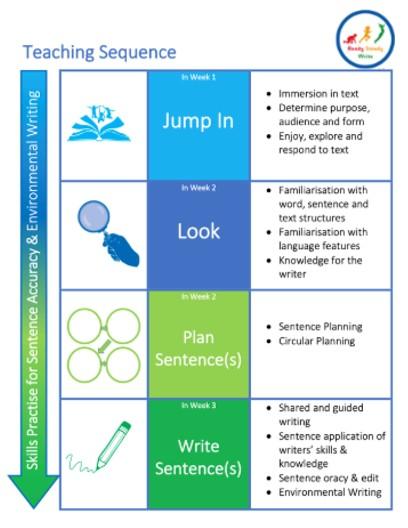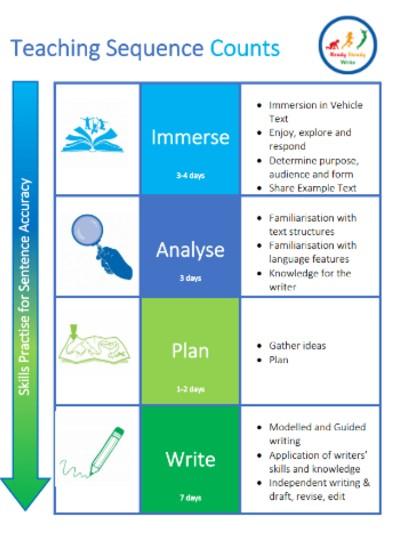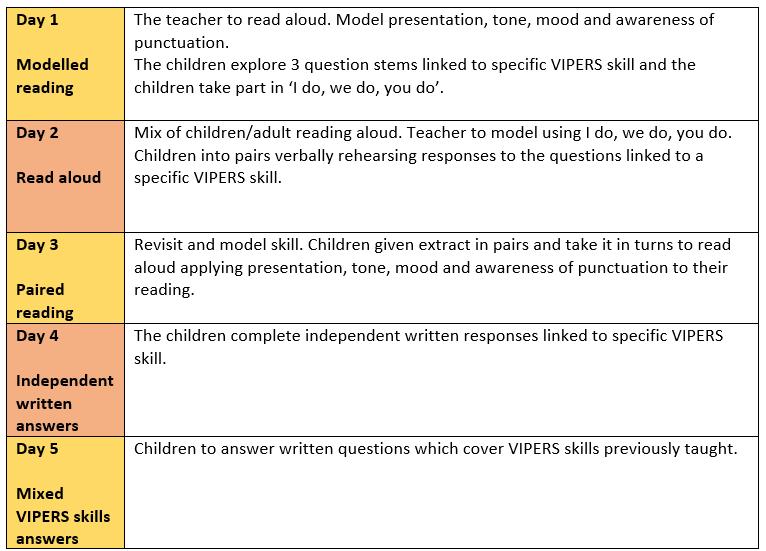

Scholes (Holmfirth) Junior and Infants
English Curriculum Statement
Staff Responsible: Kirsty Fox
This document outlines the purpose, nature and management of the teaching and learning of English in our school. It reflects the views of all the current teaching staff and was drawn up as part of whole-staff INSET training. It has the full agreement of all subject leaders. The implementation of the subject is the responsibility of all staff in school and will be monitored by the SLT and subject leader(s). An action plan is linked to this curriculum area in order to develop the subject within our changing school.
The Nature of English
The English curriculum is designed to develop children’s love of reading, writing and discussion and prepare our learners for life as successful, valuable and socially responsible citizens. We inspire an appreciation of our rich and varied literary heritage and a habit of reading widely and often. We nurture a culture where children take pride in their writing, can write clearly, imaginatively and accurately and adapt their language and style for a range of contexts. We inspire children to be confident in the art of speaking and listening and to use discussion to communicate and further their learning in all areas of the curriculum.
Intent
The national curriculum states that English has a pre-eminent place in education and in society. A high-quality education in English will teach pupils to speak and write fluently so that they can communicate their ideas and emotions to others and through their reading and listening, others can communicate with them. Through reading in particular, pupils have a chance to develop culturally, emotionally, intellectually, socially and spiritually. Literature, especially, plays a key role in such development. Reading also enables pupils both to acquire knowledge and to build on what they already know. All the skills of language are essential to participating fully as a member of society; pupils, therefore, who do not learn to speak, read and write fluently and confidently are effectively disenfranchised.
Through our CLEAR intent, we ensure that learning is planned thoroughly around the distinct needs of children at Scholes School.
Communicative
We aspire for our children to be able to articulate their thinking. In English, lessons are driven through the development of oracy skills and their expansion and use of new vocabulary. Through this they show their ability to extend their thinking and deepen their understanding of texts and their own writing.
This is demonstrated through:
• Questioning by teachers and pupils
• Partner and group discussions
• Explaining and evaluating through verbal and written work
• Vocabulary used by teachers and pupils
In English, we ensure that pupils reflect back on, and have a good understanding of grammatical vocabulary, taught in previous year groups. This ensures that pupils have a knowledge base on which to build.
Local
At Scholes, we draw upon the richness of our local area. Where possible, we use the local area for visits which link with our English curriculum. For example in Year 5, children read ‘the Lost Book of Adventure Survival Guide’ and make links to Geography when studying our local area. Year 6, study the impact of war on the local area and links to the book Rose Blanche. As a school, we make links with the local books shops and encourage library visits.
Enriched
Our English curriculum provides children with new and exciting opportunities and experiences that they would not necessarily have access to away from school. These opportunities allow the children to deepen and apply their knowledge in real life contexts. For example, Year 5 have access to real Moon rock samples from NASA which links to their writing a Mission Log about the first moon landings.
Ambitious
At Scholes all areas of our English curriculum are ambitious for all children. The English curriculum is adapted, designed and developed to meet the needs of pupils with SEND, developing their knowledge, skills and abilities to apply what they know and can do with increasing fluency and independence. Work is adapted as appropriate to pupils’ needs, and is designed to be challenging for all children, but support is there for them to experience success. Core texts are selected which include language and themes to challenge children at an age-appropriate level.
Remembered
English lessons include frequent forwards and backwards referencing to link learning within units and across year groups. For example, we carry out daily sentence accuracy practice and grammar retrieval to reinforce concepts which have been previously taught.
At the end of each term, pupils’ understanding of spelling, grammar and punctuation is assessed through a variety of tests and through the analysis of their writing. Also, pupils are assessed in comprehension, fluency, word recognition and phonic understanding so that tailored support can be put in place for all pupils.
All planning is shared in school, so that subsequent teachers can use this to inform their English planning where necessary.
Key questions on planning are also used throughout lessons, to check what pupils have remembered. Teachers can adapt their teaching input and explanations to ensure that misconceptions are corrected throughout lessons.
Implementation Organisation and Planning –
English at Scholes School is taught according to the guidance as part of the 2014 National Curriculum.
Writing is taught through the delivery the comprehensive and evidence-based approach Ready Steady Write. This provides a sequenced, ambitious curriculum, that places quality literature at its core. The units have been carefully mapped out to match the entire statutory curriculum for writing. Pupils follow the Ready Steady Write sequence below. This aligns with the Education Endowment Foundation’s key recommendations for improving writing in EYFS, KS1 and KS2.


Reading comprehension is taught through the VIPERS. This is the application of core comprehension skills using the acronym VIPERS. Each skill focuses on a core element of the comprehension curriculum and is closely linked to assessment framework for writing.
Vocabulary
Inference
Prediction
Explanation
Retrieval
Sequencing (KS1)/summary (KS2)
Reading comprehension is taught using the following sequence.

See the curriculum statement for Phonics to see how phonics is delivered.
See our EYFS policy for information on how our early years curriculum is delivered.
Continuity and Progression
Class teachers plan the subjects for their year group and then, as part of Key Stage teams and the work of subject leaders, ensure that there is progression across the team. The subject leader ensures there is clarity within the curriculum across school. This is then built into the long-term plan for school. The class teacher, with key stage partners, will ensure that the statutory objectives from the National Curriculum have been covered. The subject leader will ensure that all objectives have been taught by the end of each key stage.
Cross Curricular Links
There are many natural links with English across the curriculum – teachers at Scholes School make these links where necessary and appropriate to focus on the desired learning objective.
Core texts from Ready Steady Write and from comprehension reading spine often link to learning in other areas of the curriculum. For example, Year 5 readNorse Mythology which closely links to their work on the Vikings. Year 6, write about the book ‘On Origin of the Species’ which links to their Science work on evolution and inheritance.
Teachers organise their curriculum timetable and are encouraged to be creative in their delivery to provide:
appropriate challenge for all abilities;
a variety of learning tasks;
opportunities for discovery;
correction of misconceptions;
appropriate assessment – predominantly formative activities.
Resources
School has a wide range of books to enable the effective delivery of English.
Banded reading books which are in line with our phonics scheme ‘Little Wandle’.
Well-stocked library which children access independently.
High quality age-appropriate texts which are used to teaching writing and comprehension.
High quality texts for class story time, which cover a wide range of themes.
Inclusion
Teachers set high expectations for all pupils. They will use appropriate assessment to plan challenging work for all groups, where appropriate, including:
• More able pupils
• Pupils with low prior attainment
• Pupils from disadvantaged backgrounds
• Pupils with SEN
• Pupils with English as an additional language (EAL) Teachers will plan lessons so that pupils with SEN and/or disabilities can study every National Curriculum subject, wherever possible, and ensure that there are no barriers to every pupil achieving.
Teachers will also take account of the needs of pupils whose first language is not English. Lessons will be planned so that teaching opportunities help pupils to develop their English, and to support pupils to take part in all subjects.
Further information can be found in our statement of equality information and objectives, and in our SEN policy and information report.
Impact
Recording and Assessment –
Pupils record their learning in writing, comprehension and phonic books
Phonic assessment:
Children are assessed using Little Wandle (please see our information on Little Wandle under the phonics tab).
Word recognition and speed assessment:
This is carried out using Fisher Family Trust’s RAP (Reading Assessment Programme). This is effective online assessment tool designed to assess pupils on their GPC (grapheme phoneme correspondence) Accuracy, decoding accuracy and fluency Levels (Words Correct Per Minute).
Grammar punctuation and spelling assessment:
This is carried out using Test Base test papers from year 2 to year 6 which follow a similar format to that of the Y6 SAT papers. This allows pupils to become familiar with the test format and for teachers to monitor pupil progress.
Comprehension assessment:
This is carried out using Test Base test papers from year 2 to year 6 which follow a similar format to that of the Y6 SAT papers. This allows pupils to become familiar with the test format and for teachers to monitor pupil progress.
Monitoring
Monitoring of English at Scholes School is carried out in a variety of ways. These include:
Work scrutiny to explore specific, pre-discussed aspects of teaching – content, application of skills taught, progress over time.
Observations where appropriate – these are usually linked to SIP requirements or Performance Management objectives
Peer observations are encouraged for staff to explore teaching styles and activities in a less formal way than observation
Pupil voice may be used to gain insight into knowledge and to attitudes towards reading and writing.
Medium-term planning will be gathered in order for the subject leader to develop and update the wholeschool long-term plan
